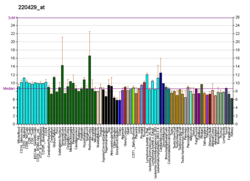From Wikipedia, the free encyclopedia
Enzyme
Bifunctional heparan sulfate N-deacetylase/N-sulfotransferase 3 is an enzyme that in humans is encoded by the NDST3 gene .[ 5] [ 6]
3'-phosphoadenylyl sulfate + α-D -glucosaminyl-[heparan sulfate ](n ) = adenosine 3',5'-bisphosphate + 2 H+ + N -sulfo-α-D -glucosaminyl-[heparan sulfate](n ) [ 7]
This is a step in the production of heparin .[ 7]
Clinical significance [ edit ] Mutations in NDST3 have been linked to schizophrenia .[ 8]
^ a b c GRCh38: Ensembl release 89: ENSG00000164100 – Ensembl , May 2017^ a b c GRCm38: Ensembl release 89: ENSMUSG00000027977 – Ensembl , May 2017^ "Human PubMed Reference:" . National Center for Biotechnology Information, U.S. National Library of Medicine .^ "Mouse PubMed Reference:" . National Center for Biotechnology Information, U.S. National Library of Medicine .^ Aikawa J, Esko JD (Mar 1999). "Molecular cloning and expression of a third member of the heparan sulfate/heparin GlcNAc N-deacetylase/ N-sulfotransferase family" . J Biol Chem . 274 (5): 2690–5. doi :10.1074/jbc.274.5.2690 PMID 9915799 . ^ "Entrez Gene: NDST3 N-deacetylase/N-sulfotransferase (heparan glucosaminyl) 3" .^ a b "NDST3 – Bifunctional heparan sulfate N-deacetylase/N-sulfotransferase 3 – Homo sapiens (Human) – NDST3 gene & protein" . www.uniprot.org . Retrieved 2020-01-15 .^ Zhang, C; Lu, W; Wang, Z; Ni, J; Zhang, J; Tang, W; Fang, Y (January 2016). "A comprehensive analysis of NDST3 for schizophrenia and bipolar disorder in Han Chinese" . Translational Psychiatry . 6 (1): e701. doi :10.1038/tp.2015.199 . ISSN 2158-3188 . PMC 5068873 PMID 26731438 .
Hillier LW, Graves TA, Fulton RS, et al. (2005). "Generation and annotation of the DNA sequences of human chromosomes 2 and 4" . Nature . 434 (7034): 724–31. Bibcode :2005Natur.434..724H . doi :10.1038/nature03466 PMID 15815621 . Gerhard DS, Wagner L, Feingold EA, et al. (2004). "The status, quality, and expansion of the NIH full-length cDNA project: the Mammalian Gene Collection (MGC)" . Genome Res . 14 (10B): 2121–7. doi :10.1101/gr.2596504 . PMC 528928 PMID 15489334 . Clark HF, Gurney AL, Abaya E, et al. (2003). "The secreted protein discovery initiative (SPDI), a large-scale effort to identify novel human secreted and transmembrane proteins: a bioinformatics assessment" . Genome Res . 13 (10): 2265–70. doi :10.1101/gr.1293003 . PMC 403697 PMID 12975309 . Strausberg RL, Feingold EA, Grouse LH, et al. (2003). "Generation and initial analysis of more than 15,000 full-length human and mouse cDNA sequences" . Proc. Natl. Acad. Sci. U.S.A . 99 (26): 16899–903. Bibcode :2002PNAS...9916899M . doi :10.1073/pnas.242603899 PMC 139241 PMID 12477932 . Aikawa J, Grobe K, Tsujimoto M, Esko JD (2001). "Multiple isozymes of heparan sulfate/heparin GlcNAc N-deacetylase/GlcN N-sulfotransferase. Structure and activity of the fourth member, NDST4" . J. Biol. Chem . 276 (8): 5876–82. doi :10.1074/jbc.M009606200 PMID 11087757 . Sanger Centre, The; Washington University Genome Sequencing Cente, The (1999). "Toward a complete human genome sequence" . Genome Res . 8 (11): 1097–108. doi :10.1101/gr.8.11.1097 PMID 9847074 . Boutry M, Vassarotti A, Ghislain M, et al. (1984). "Isolation of the structural genes for the alpha and beta subunits of the mitochondrial ATPase from the fission yeast Schizosaccharomyces pombe" . J. Biol. Chem . 259 (5): 2840–4. doi :10.1016/S0021-9258(17)43223-6 PMID 6230352 .





